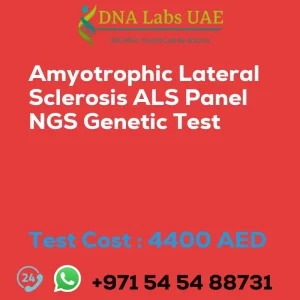Nx GEN SEQUENCING MEGALOENCEPHALIC LEUKOENCEPHALOPATHY WITH SUBCORTICAL CYSTS Test
Test Cost: AED 4680.0
Symptoms and Diagnosis
Megalencephalic leukoencephalopathy with subcortical cysts (MLC) is a rare genetic disorder that affects the brain. It is characterized by the presence of large brain size (megalencephaly) and the formation of fluid-filled cysts in the subcortical regions of the brain.
To diagnose MLC, a genetic test called next-generation sequencing (NGS) can be performed. NGS is a high-throughput sequencing technology that allows for the simultaneous analysis of multiple genes or even the entire genome. It can identify mutations or variations in specific genes associated with MLC.
The specific genes commonly analyzed in NGS testing for MLC include MLC1 and HEPACAM. Mutations in these genes have been found to be responsible for the majority of MLC cases. By analyzing these genes using NGS, healthcare professionals can determine if there are any genetic abnormalities that are causing MLC in an individual.
NGS testing for MLC can be done using a blood sample or other tissue samples from the affected individual. The sample is processed in a laboratory, and the genetic material is sequenced using NGS technology. The resulting data is then analyzed to identify any mutations or variations in the MLC-associated genes.
It is important to note that NGS testing may not always detect all mutations or variations in the genes associated with MLC. In some cases, additional testing or alternative genetic testing methods may be necessary for a definitive diagnosis.
Test Details
- Test Name: Nx GEN SEQUENCING MEGALOENCEPHALIC LEUKOENCEPHALOPATHY WITH SUBCORTICAL CYSTS Test
- Test Components: MLC1, HEPACAM
- Price: AED 4680.0
- Sample Condition: Submit 10 mL (5 mL min.) whole blood from 2 Lavender Top (EDTA) tubes. Ship refrigerated. DO NOT FREEZE. Duly filled Whole Exome Sequencing Consent Form (Form 37) is mandatory.
- Report Delivery: Sample Daily by 9 am; Report 40 Working days
- Method: NGS, Sanger sequencing
- Test Type: Genetic Disorders-Macrocephaly
- Doctor: Neurologist
- Test Department: MOLECULAR DIAGNOSTICS
- Pre Test Information: Duly filled Whole Exome Sequencing Consent Form (Form 37) is mandatory.
Conclusion
Overall, NGS testing for megalencephalic leukoencephalopathy with subcortical cysts is a valuable tool in diagnosing this rare genetic disorder and can provide important information for treatment and management strategies.
| Test Name | Nx GEN SEQUENCING MEGALOENCEPHALIC LEUKOENCEPHALOPATHY WITH SUBCORTICAL CYSTS Test |
|---|---|
| Components | MLC1, HEPACAM |
| Price | 4680.0 AED |
| Sample Condition | Submit 10 mL (5 mL min.) whole blood from 2 Lavender Top (EDTA) tubes. Ship refrigerated. DO NOT FREEZE. Duly filled Whole Exome Sequencing Consent Form (Form 37) is mandatory. |
| Report Delivery | Sample Daily by 9 am; Report 40 Working days |
| Method | NGS, Sanger sequencing |
| Test type | Genetic Disorders-Macrocephaly |
| Doctor | Neurologist |
| Test Department: | MOLECULAR DIAGNOSTICS |
| Pre Test Information | Duly filled Whole Exome Sequencing Consent Form (Form 37) is mandatory. |
| Test Details |
Megalencephalic leukoencephalopathy with subcortical cysts (MLC) is a rare genetic disorder that affects the brain. It is characterized by the presence of large brain size (megalencephaly) and the formation of fluid-filled cysts in the subcortical regions of the brain. To diagnose MLC, a genetic test called next-generation sequencing (NGS) can be performed. NGS is a high-throughput sequencing technology that allows for the simultaneous analysis of multiple genes or even the entire genome. It can identify mutations or variations in specific genes associated with MLC. The specific genes commonly analyzed in NGS testing for MLC include MLC1 and HEPACAM. Mutations in these genes have been found to be responsible for the majority of MLC cases. By analyzing these genes using NGS, healthcare professionals can determine if there are any genetic abnormalities that are causing MLC in an individual. NGS testing for MLC can be done using a blood sample or other tissue samples from the affected individual. The sample is processed in a laboratory, and the genetic material is sequenced using NGS technology. The resulting data is then analyzed to identify any mutations or variations in the MLC-associated genes. It is important to note that NGS testing may not always detect all mutations or variations in the genes associated with MLC. In some cases, additional testing or alternative genetic testing methods may be necessary for a definitive diagnosis. Overall, NGS testing for megalencephalic leukoencephalopathy with subcortical cysts is a valuable tool in diagnosing this rare genetic disorder and can provide important information for treatment and management strategies. |








